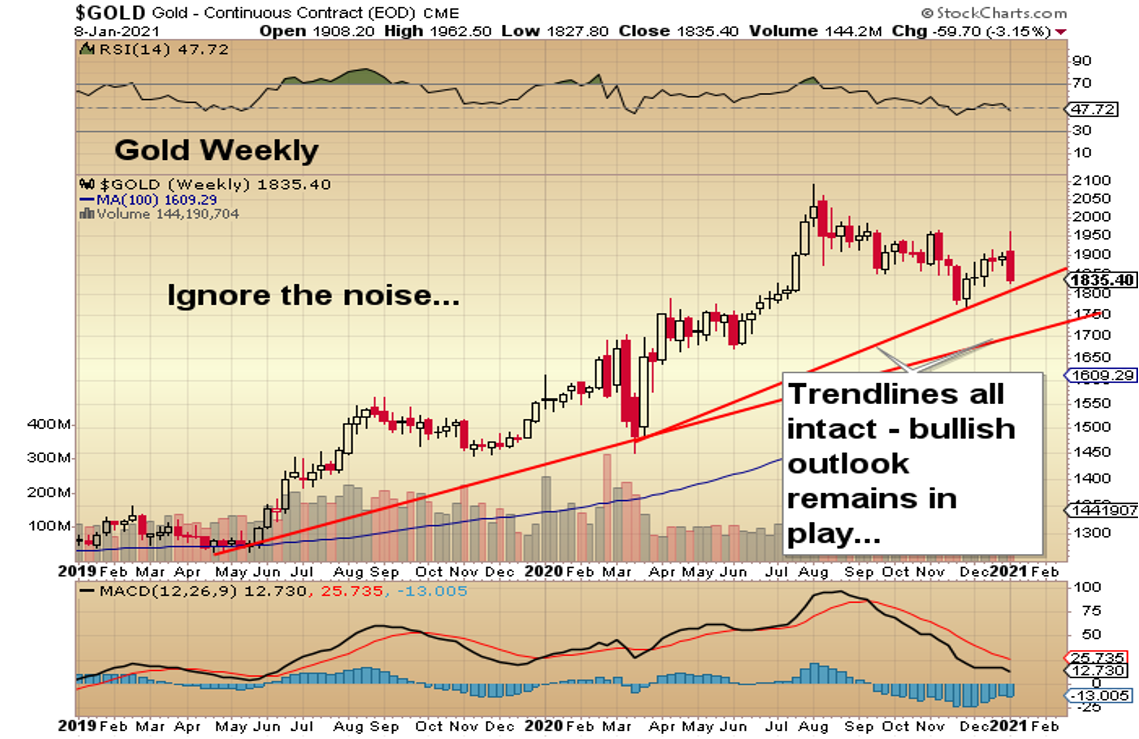The events of this week are dominating the news cycle, with a sitting president days away from being replaced while Congressional and Senatorial leaders debate whether he should be impeached immediately.
If I were having a chat with Mr. Trump, I would advise him to refrain from reading his own press clippings because they will only offer you glimpses of past glory and never reveal the reality of the moment. It's like that great story where Gordie Howe asks a hungover rookie to pick up his game, to which the rookie replies, "I had four goals last night; I can afford a night off." Gordie placed his size fifteen hand around the kid's neck, slowly squeezing, and said "Son, you are only as good as your last shift." Trump should have been on the bench to hear that.
In fact, Gordie Howe would have been a superb chief of staff, because no one (including the president) would dare deviate from what can only be described as "proper decorum," and inciting a mob of "deplorables" to storm the Capitol building would certainly have had Gordie's attention.
As a former resident of the U.S., I carry two dominant emotions with me as I watch the mayhem in Washington. The first one is heartbreak: I mourn the loss of America's role as global beacon of social order. The second is terror: I fear for the millions of U.S. citizens that deserve better—and there are hundreds of millions that get up every morning in search of gainful employment, freedom of speech and love of family.
However, that the 1% elite have chosen to gut the American middle class in order to earn their stock option bonuses have brought this civil sword of Damocles upon themselves, with a violence of conviction and solidarity of intent. The Law of Unintended Consequences dictates a certainty of negative outcome when lawmakers favor the elite and ignore the masses. Just go back and read Ayn Rand's "Atlas Shrugged," and you will be astounded that it was written in 1957 rather than in 2020, because Rand's description of a futuristic America is exactly where we are today. It sad; it is heartbreaking; and it is enraging. It is also going to change.
Alas, after a precious metal rout the likes of which we saw on Friday, the very first task on the agenda for a purist like me is to assess the longer-term impact of the technical action for both gold and silver, and then reassess. Before I proceed, there is a Ballanger Rule that absolutely must be heeded, and that rule is this:
"Only in the gold and silver markets does one sell "breakouts" and buy "breakdowns." Why? Because they are rigged."
To most readers, statements like this evoke yawns, because anyone familiar with my work over the years has heard that rule so many times that it is like reciting the 23rd Psalm or the Oath of Allegiance. (A better example would be The Lord's Prayer, but since one of my resolutions for 2021 is to avoid offending people, I will try to befriend the 22.7% of non-Christians at the risk of alienating the 77.3% majority, as logically inane as they may appear.)
Charts are beautiful things to behold, particularly for stocks and commodities, because they are like roadmaps that explain where you are and where you were, and if you delicately engage in the Art of Extrapolation (with a Ouija board and a pair of dice), you can often discern the next movement in the market and book profits.
In gold and silver, the bullion banks that act for the large Commercials also use charts, but they don't just "use" charts, they deploy all manner of watercolors, oils and acrylics to create optics that will lure the masses into either bullish actions or bearish actions, all designed to create accelerated volumes into which to sell large synthetic positions of (alleged) gold and silver bullion. In other words, the Wall St. bullion banks are wizards at "painting the tape," and that is why they are able to orchestrate "takedowns" with such violent mastery and malevolent outcome.
With a decidedly leftist government about to assume the helm, money spigots firmly in the crosshairs, the last thing the financial spin doctors need is a soaring precious metals market. The action on Friday on a disappointing jobs report and decomposing U.S. dollar was predictable; they need to keep things orderly in the financial arena to offset the disorder in the political arena. Hence, we got a totally familiar intervention and reactionary panic, and while it is near-term both infuriating and absurd, it is simply "noise" of the highest order.

Interestingly, Friday, Jan. 8 was as close to a carbon-copy clone to the infamous "Sunday Night Massacre" of April 13, 2013, when, during the overnight session, certain "entities" dumped literally four times annual global gold production into the paper market exchange, crushing a decade-long uptrend. Friday's volumes reported on the Crimex had nothing to do with the movement of actual gold; it had everything to do with the pricing of gold futures.
As subtle a difference as that may appear, one glance at the weekly chart posted above reveals a market that remains in a powerful uptrend that will remain in effect even if the price pulls back to $1,700/ounce.
Now, I do not subscribe to the view that prices are headed lower over the near term. In fact, I believe that the odds favor Friday's Crimex low of US$1,827.80/ounce as being "the" low for the move. The weekly chart removes the "noise" from my analysis and portrays a much more benevolent picture than a daily or hourly chart, which is what is watched day to day, hour by hour, by all forms of millennial and Gen-Xer portfolio managers, whose collective psyche has their definition of a "long-term investment" being in and out by lunch hour.

Silver has an even better set-up than gold because it is not coming off anything close to an overbought condition and still remains around US$1.50/ounce above the uptrend line, giving it a distinct technical advantage over gold. As for portfolio allocations, I have no preference between gold and silver; I own physical metals in both and am overweight shares in developer/explorers in both, while holding a decent cash position that is seeking out opportunities in both.
I have elected to use Barrick Gold Corp. (ABX:TSX; GOLD:NYSE) (US$23.97/share) as my proxy for the senior gold miners, and own the position from Nov. 30, at US$22.65. I am using Eldorado Gold Corp. (ELD:TSX; EGO:NYSE) (US$13.17) as my proxy for the junior gold miners, and own the position from Nov. 30 at US$12.60, so while they are not breaking records, they are exactly where I want to be.
Moving to another topic, it was one year ago that I gave offered my GGMA 2020 Portfolio and urged all subscribers to not buy it until I gave the green light. My reasons were simple; the U.S. and Canadian stock markets and the miners were overbought and were, in my opinion, overdue for a pullback. Here we are, one year later, and I am once again torn between the egregiously overbought stock markets and the bearish implications of the mutated virus and the undervalued precious metals markets, whose fundamentals are as bullish as I have ever seen in forty-five years of capital markets navigation.
The problem lies in trying to assess where the precious metals will be when (not if) the bubble pops and Bitcoin and U.S. growth stocks all get pummeled into oblivion. As we saw last March, outrageously bullish fundamentals for gold and silver mattered not when the pandemic panic took hold. As we now can see, silver was cheap pre-COVID crash at $18/ounce, but it got smoked to $12 into the liquidity regurgitation before resuming the much-deserved uptrend to nearly $30.
As I wrote about earlier in the week, in Email Alert 2021-03, in all "bubble" markets, price behaves orderly over 90% of the advance and usually adheres to a smooth 45° ascent until the finally 10% of the move during, which it always accelerates into a parabolic vertical ascent that marks the terminus of the move. The psychology of this advance lies in the phenomena called "FOMO" or "Fear Of Missing Out," and it is that point, over the last five hundred years, where a maximum of fortune was lost. South Sea bubble or Dutch tulip bulbs or the Roaring Twenties, from the distant past, are joined by late '70s silver bubble, the late '90s dotcom bubble, the 2008 housing bubble and finally the current "everything" bubble, where currency debasement in response to the pandemic has created a cash-revulsion not unlike Weimar Germany or Zimbabwe or present-day Venezuela.

We are in the final innings—extra innings in my book—of a global collective of mass speculation in almost everything. With the CAPE ratio even further extended than it was a week ago, the bubble that threatens to derail everything is the speculation bubble. Owning bonds paying a negative return is the ultimate form of financial risk ignorance; paying someone to borrow money from you is economic suicide—and yet it is pervasive around the globe. Storing one's life savings in a little box on your desk, totally reliant on electrical power and vulnerable to theft, is a highly speculative venture and yet entire generations are totally engaged in it and prospering with a near-religious fervor that resembles Cisco Systems in 1999 or U.S. Steel in 1929.
Ironically, the one sector that should be in "bubble" territory, having 5,000 years of currency-debasement history—gold and silver—are not anywhere close to rampant speculation status. In fact, the outlook for earnings growth for both is simply outstanding—but in the same breath that I use the word "outstanding," I am forced to use the word "unpopular," because the new generations of stock junkies buying Tesla at 300 times book value could care less about Barrick trading at two times free cash flow.
So, what I need to see (and it might remain highly elusive) is a return to traditional stock analysis by these legions of youngsters, where value trumps momentum and risk management trumps risk acceptance.
Most certainly, a major 40–50% correction in the most widely owned "bubble" assets of 2021 would swing the pendulum back in favor of our sector, but I have to look in the mirror and ask, "Will it happen?", or better still, "If it happens again, like last March, will my portfolio be dragged down despite outstanding balance sheets and torrid income statements?"
While there is no sense debating the fundamentals for gold and silver, here in 2021, with moderate energy costs and superb revenue outlooks, it is demand versus supply that determines whether a stock or commodity goes up or down, and until we can figure out who exactly it is that sells Barrick at five times forward earnings to buy a tech stock at fifty times forward earnings, it remains a guessing game.
I will continue to invest my capital in a manner that adheres to the time-tested strategy of owning companies that are undervalued relative to their peers or relative to the broad market. Investing in gold and silver developers involves a certain degree of speculation, but is where the risks are definable and trackable, such that I can react to corporate developments gradually and not suddenly, which is where most people make mistakes.
You all have to remember that in all markets, there are always going to be assets that are going up faster than yours, and that is what triggers the greed in you. I recall being lectured by a youngster in 2008 who had just seen his Blackberry stock hit $140 per share from the $8 he paid in 2004, and how I agonized but refused to bend only to watch it crash and burn a few years later. A house, a cottage and marriage represented the collateral damage associated with undue hubris, as it is that very result that usually dominates cult-like devotion to any investment or asset class.
I intend to avoid any asset class where valuation is suspect; I intend to be overweight any asset class where valuation is seriously underappreciated. You know which assets fall in the former category; gold and silver belong solidly in the latter camp.
Invest accordingly.
Originally posted on Jan. 9, 2021
Follow Michael Ballanger on Twitter @MiningJunkie.
Originally trained during the inflationary 1970s, Michael Ballanger is a graduate of Saint Louis University where he earned a Bachelor of Science in finance and a Bachelor of Art in marketing before completing post-graduate work at the Wharton School of Finance. With more than 30 years of experience as a junior mining and exploration specialist, as well as a solid background in corporate finance, Ballanger's adherence to the concept of "Hard Assets" allows him to focus the practice on selecting opportunities in the global resource sector with emphasis on the precious metals exploration and development sector. Ballanger takes great pleasure in visiting mineral properties around the globe in the never-ending hunt for early-stage opportunities.
[NLINSERT]Disclosure:
1) Michael J. Ballanger: I, or members of my immediate household or family, own securities of the following companies mentioned in this article: Barrick Gold and Eldorado Gold. My company has a financial relationship with the following companies referred to in this article: None. I determined which companies would be included in this article based on my research and understanding of the sector. Additional disclosures are below.
2) The following companies mentioned in this article are billboard sponsors of Streetwise Reports: None. Click here for important disclosures about sponsor fees. Please click here for more information.
3) Statements and opinions expressed are the opinions of the author and not of Streetwise Reports or its officers. The author is wholly responsible for the validity of the statements. The author was not paid by Streetwise Reports for this article. Streetwise Reports was not paid by the author to publish or syndicate this article. Streetwise Reports requires contributing authors to disclose any shareholdings in, or economic relationships with, companies that they write about. Streetwise Reports relies upon the authors to accurately provide this information and Streetwise Reports has no means of verifying its accuracy.
4) This article does not constitute investment advice. Each reader is encouraged to consult with his or her individual financial professional and any action a reader takes as a result of information presented here is his or her own responsibility. By opening this page, each reader accepts and agrees to Streetwise Reports' terms of use and full legal disclaimer. This article is not a solicitation for investment. Streetwise Reports does not render general or specific investment advice and the information on Streetwise Reports should not be considered a recommendation to buy or sell any security. Streetwise Reports does not endorse or recommend the business, products, services or securities of any company mentioned on Streetwise Reports.
5) From time to time, Streetwise Reports LLC and its directors, officers, employees or members of their families, as well as persons interviewed for articles and interviews on the site, may have a long or short position in securities mentioned. Directors, officers, employees or members of their immediate families are prohibited from making purchases and/or sales of those securities in the open market or otherwise from the time of the decision to publish an article until three business days after the publication of the article. The foregoing prohibition does not apply to articles that in substance only restate previously published company releases.
Michael Ballanger Disclaimer: This letter makes no guarantee or warranty on the accuracy or completeness of the data provided. Nothing contained herein is intended or shall be deemed to be investment advice, implied or otherwise. This letter represents my views and replicates trades that I am making but nothing more than that. Always consult your registered advisor to assist you with your investments. I accept no liability for any loss arising from the use of the data contained on this letter. Options and junior mining stocks contain a high level of risk that may result in the loss of part or all invested capital and therefore are suitable for experienced and professional investors and traders only. One should be familiar with the risks involved in junior mining and options trading and we recommend consulting a financial adviser if you feel you do not understand the risks involved.





























































